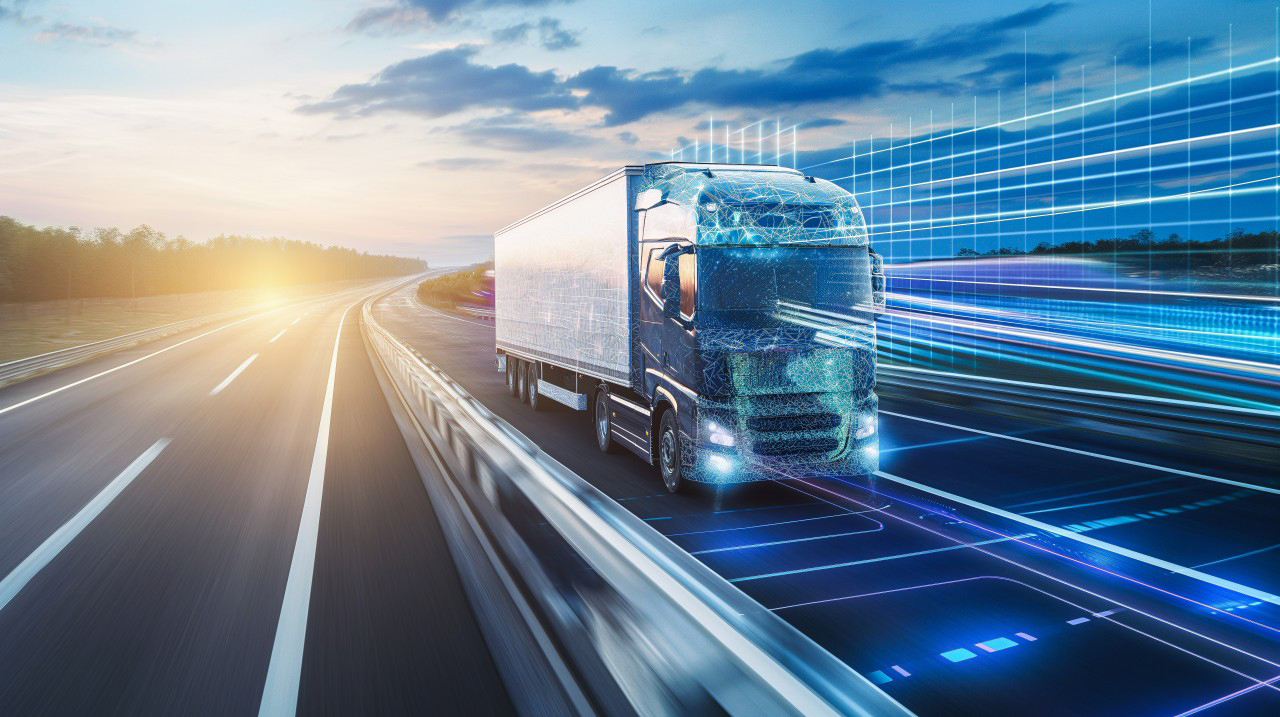
Susie Jones
KI und ihre Auswirkungen auf die Nachhaltigkeit im Transportgewerbe
Erstellt: 29.08.2024
•
Aktualisiert: 29.08.2024
Künstliche Intelligenz (KI) ist ein Begriff, der in den letzten Jahren Teil des modernen Wortschatzes geworden ist. Aufgrund mangelnden Verständnisses und falscher Vorstellungen wird er oft negativ wahrgenommen. Trotz aller Vorbehalte kann sich KI positiv auf Nachhaltigkeit, Arbeitsprozesse und die Wirtschaft auswirken. Kann KI angesichts der Tatsache, dass über [25 %] (https://dyce-carriers.co.uk/haulage-firms/) der CO2-Emissionen von der Verkehrsindustrie verursacht werden, einen positiven Beitrag zu einer nachhaltigen Zukunft leisten?
Was ist AI?
Laut Oxford Languages ist AI:
"die Theorie und Entwicklung von Computersystemen, die in der Lage sind, Aufgaben auszuführen, die normalerweise menschliche Intelligenz erfordern, wie visuelle Wahrnehmung, Spracherkennung, Entscheidungsfindung und Übersetzung zwischen Sprachen ".
Nachhaltigkeit in der Speditionsbranche
Die Branche befindet sich an einem kritischen Scheideweg, denn die Nachfrage steigt und die Art der Zustellung ändert sich - Online-Shopping ist eine der am schnellsten wachsenden Anforderungen. Während die steigende Nachfrage dem Transportgewerbe zugute kommen kann, steht es vor einem ökologischen Dilemma, das sich entscheidend auf den Planeten auswirkt.
Die Industrie beeinflusst die Umwelt auf folgende Weise:
Lärmbelästigung: In großer Zahl können Lkw zur Lärmbelästigung beitragen. Lärmbelästigung stört städtische und ländliche Gebiete und beeinträchtigt oft das Wohlbefinden von Anwohnern und Wildtieren. Eine hohe Lärmbelastung kann zu Stress und Herz-Kreislauf-Problemen führen.
Kohlenstoff-Emissionen: Herkömmliche Kraftstoffe in Lkw setzen CO2 in die Atmosphäre frei. Von den gesamten weltweiten Verkehrsemissionen entfallen 29 % auf den Lkw-Verkehr.
Luftqualität: Lkw stoßen Stickoxide und Feinstaub aus - beides verschlechtert die Luftqualität, schadet der Umwelt und führt bei Menschen zu Atemproblemen.
Wie KI die Nachhaltigkeit verbessern kann
Routenplanung: Eine unzureichende Routenplanung kann Flotten Geld, Zeit und Ressourcen kosten. KI kann den Bedarf und die Anforderungen genau vorhersagen und die nachhaltigste Route empfehlen. Ihre Algorithmen können Verkehrsmuster, Wetterbedingungen und Kraftstoffeffizienz analysieren, um die Lieferrouten zu optimieren. Dieser Prozess spart Geld und trägt zur Senkung der Kohlenstoffemissionen bei.
Vorhersage der Verbrauchernachfrage: Oft werden Produkte an den Verbraucher geliefert, aber nicht abgeholt, was zu einer Verschwendung von Ressourcen und einer erheblichen Umweltbelastung führt. Mithilfe von maschinellem Lernen und prädiktiver Analyse können Hersteller die Nachfrage vorhersehen, das Angebot rationalisieren und die Fertigungsprozesse optimieren. Durch aussagekräftige Einblicke in die Lieferung und den Nichterhalt von Waren kann die KI Logistikunternehmen darüber informieren, welche Waren zu versenden sind - und so Umweltprobleme an der Quelle angehen.
Fahrerüberwachung: KI-Algorithmen analysieren Fahrermuster, z. B. Geschwindigkeitsüberschreitungen, starkes Bremsen und Leerlauf. Auf dieser Grundlage kann die KI Anreize für eine kraftstoffsparende Fahrweise geben.
Energieeinsparung: KI kann Flottenunternehmen bei ihrem Energiemanagement in der gesamten Lieferkette unterstützen. Sie kann ineffiziente Bereiche identifizieren und Optimierungsstrategien anbieten - einschließlich der Analyse von Daten aus intelligenten Zählern, Sensoren und anderen Geräten, um zu ermitteln, was zu viel Energie verbraucht.
Wird KI die Logistikbranche übernehmen?
Obwohl der Einsatz von KI in der Logistikbranche eine Rolle spielen wird, ist es unwahrscheinlich, dass sie die Branche vollständig übernehmen wird. KI-Algorithmen können spontane Ereignisse und Ausnahmen nicht berücksichtigen - daher wird das menschliche Engagement weiterhin eine entscheidende Rolle spielen. Die Karrieremöglichkeiten im Transportgewerbe werden weiterhin bestehen, aber sie werden sich deutlich verändern.
Wie kann die Industrie ihre Kohlenstoffemissionen sonst noch reduzieren?
Die Industrie kann folgende Maßnahmen ergreifen:
Emissionsarme Fahrzeuge: Elektro- und Hybrid-LKWs können die Kohlenstoffemissionen reduzieren. Beide sind für den Kurz- und Langstreckentransport geeignet.
Alternative Kraftstoffe: Angesichts der Tatsache, dass Net-Zero 2050 in greifbare Nähe rückt, wird in der Energiegesetzgebung der Schwerpunkt auf sauberere Alternativen gelegt. Hydrotreated Vegetable Oil (HVO) kann die Emissionen sofort und erheblich reduzieren. [Certas Energy HVO (https://certasenergy.co.uk/my-business/products/hvo/hvo-faq-fuel-guide/) steht hinter dem Wechsel zu einer saubereren Alternative und hilft Unternehmen, ihre Nachhaltigkeitsziele zu erreichen und sinnvolle Schritte in Richtung einer Netto-Null-Zukunft zu unternehmen. HVO bietet die folgenden Vorteile:
Eine unmittelbare Verringerung der Treibhausgasemissionen um bis zu [90 %] (https://www.gov.uk/government/publications/greenhouse-gas-reporting-conversion-factors-2023) im Vergleich zu herkömmlichem Diesel über den gesamten Produktlebenszyklus.
Weniger Stickoxide als herkömmlicher Diesel
Weniger Feinstaub als Standard-Diesel
Biologisch leicht abbaubar
Lange Lagerfähigkeit von bis zu 10 Jahren
Praktisch FAME-frei
Drop in alternativer Diesel - es sind keine Änderungen am Motor oder an der Infrastruktur erforderlich.
Fahrzeugeffizienz: Kraftstoffsparende Motoren, geringere Leerlaufzeiten und regelmäßige Wartung können die Effizienz verbessern.
Intelligente Verpackungen: Die Hersteller können für den Versand von Produkten biologisch abbaubare und recycelte Materialien verwenden - das reduziert den Abfall und senkt die Kosten. Außerdem verbessern leichtere Verpackungen die Effizienz, was zu geringeren Kohlenstoffemissionen führt.
Erneuerbare Energie: Die Nutzung erneuerbarer Energiequellen wie Sonnen- oder Windenergie im Betrieb kann die Kohlenstoffemissionen erheblich reduzieren.
Reduzieren Sie Umwegkilometer: Mit SNAP Account können Flottenmanager ihre Umwegkilometer reduzieren - bei über 600 Servicepartnern, die SNAP Account-Kunden zur Verfügung stehen, gibt es bestimmt einen Stopp auf Ihrer Route.


